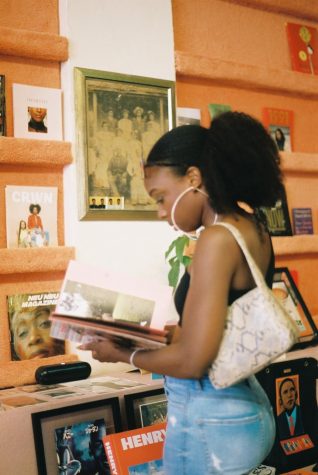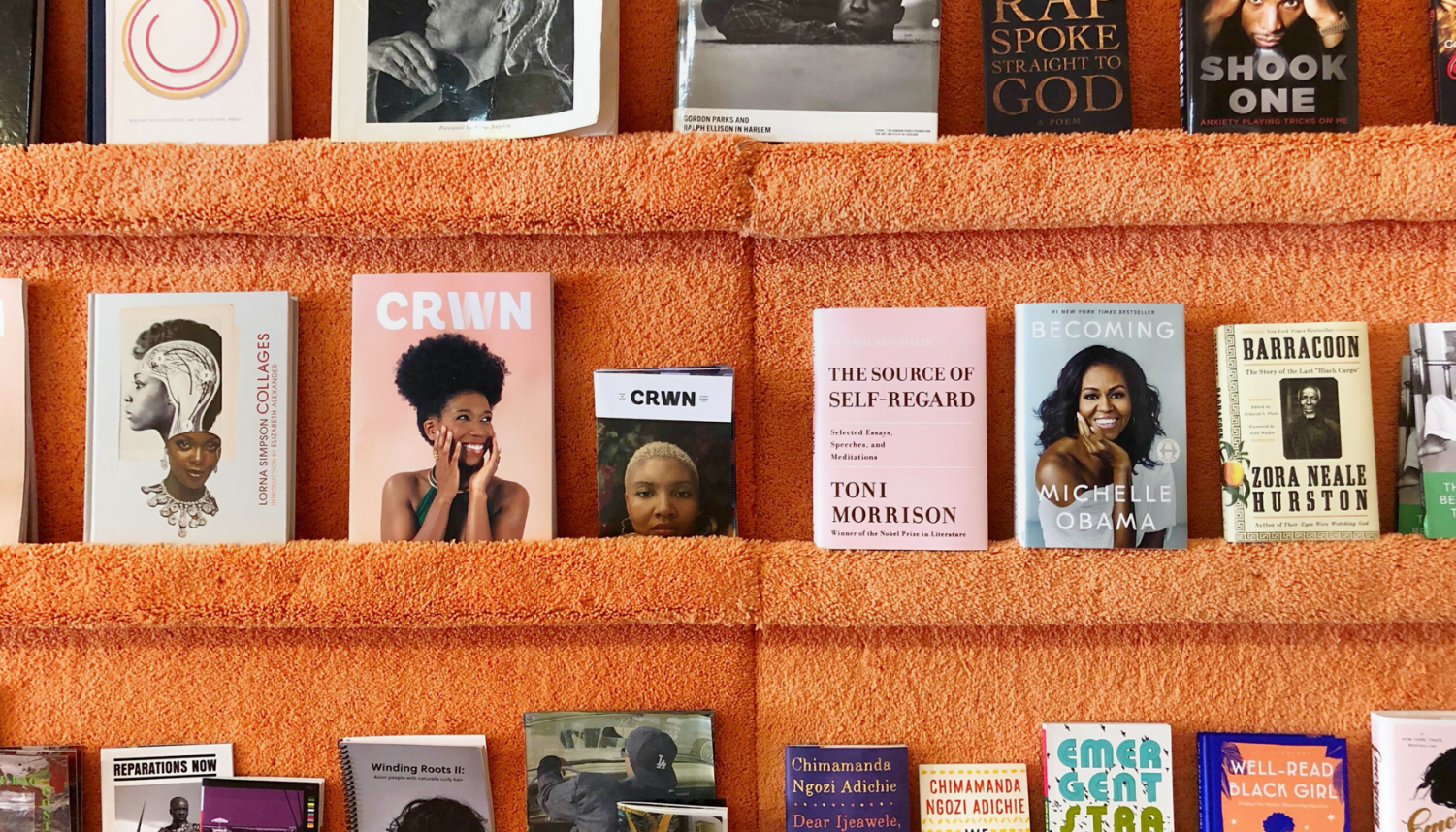Black literati encourage “decolonizing your bookshelf”
Aug 26, 2020
As developments regarding the systemic racism and policing of Black people continue across the country, an outlet that is becoming increasingly pertinent is reading.
The process of “decolonizing your bookshelf” –– getting rid of books that center around white, eurocentric, heteronormative and colonialist ideas of narrative, storytelling and literature –– is a now-popular circulated phrase across social media. What’s been used as a stress reliever is now being reamplified to analyze eurocentric ideologies and openly challenge social consciousness in the country’s deeply-rooted racism.
“I think a lot of people are reckoning with their sort of implicit bias and taking a look at their bookshelves and realizing they haven’t read a book by a Black author, maybe ever, in some cases,” Jazzi McGilbert, founder of the Los Angeles based Black-owned local bookstore Reparations Club, said. A Los Angeles native, McGilbert founded her business “primarily for the Black and Brown community in Los Angeles and beyond” after noticing a lack of retail spaces conveying inclusiveness and creativity.
“I wish that weren’t the case, but I think it’s definitely good for people to decolonize bookshelves, and if they need a hashtag to take a look and do that then great. I think it ultimately benefits everybody involved,” McGilbert said.
Following the death of George Floyd, McGilbert said now is an especially pertinent time to engage in conversations about race through the work of Black authors. To encourage this activity, The Reparations Club curated an anti-racism category on its website.
“Even if you’re just getting back into reading, which I’ve heard a lot of people are during the pandemic, [it] might be a little challenging. Some of these theories and concepts might be unfamiliar to people,” McGilbert said. “Something that’s helpful is having conversations, not just keeping it inside the book itself but reading between the lines and having conversations with friends and family. Joining a book club is so useful and there are a lot of virtual book clubs now to actually get to discuss some of these things is a really valuable resource.”
McGilbert noted that she’s seen a recent shift in the consciousness of book shoppers. She added that people who choose to spend their money with her business, especially on books, are making a decision to divest their dollars from corporations like Amazon and consciously supporting local.
In a close partnership with Chicago rapper Noname, founder of Noname Book Club in 2019, Reparations has been the “L.A. flagship” for the book club’s monthly meetups. The book club has continued to highlight two books by authors of color each month even throughout the pandemic, and its founder is anti-Amazon; she created the club’s “National Fuck Amazon Day,” which began on January 11 of this year.

“She started the book club pretty closely timed with when we open the shop, so we met through mutual friends, and it was just a really natural partnership,” McGilbert said. “We’ve been involved since the second book club meeting, and it’s really great. Lots of familiar faces that have become family for the shop and brought in a lot of new people who might not have heard of us otherwise. With Noname herself, I just see the book club growing and growing. That’s beautiful to see from the start.”
In addition to bookstores, public libraries are also providing resources and services in support of the collective uprising that has stretched into its third month of protesting across the country.
“I think decolonizing bookshelves is a very essential piece to the revolution of overthrowing white supremacy,” said Shannon Bland, branch manager for the Waldorf West branch library in Waldorf, Maryland, and founder of the online community @BlackLibrarians. “I think it’s key though to remember that having a few Black titles doesn’t bring diversity. We are a diverse people in ourselves, so it’s important to have diverse Black stories. Everything doesn’t have to be a history lesson or struggle story; those stories are important, but Black superhero stories, Black fantasy and sci-fi stories, etc. are important as well.”
Bland has been working in libraries for the past seven years and said she hopes libraries are taking this time as an opportunity to assess how white supremacy impacts the field and analyzing what is being done to combat that. The narratives and stories that can be found within anti-racist booklists are meant to have a profound impact and help process for an audience the history of injustices towards the Black community.
She added that when approaching the topic of racism through literature, it is crucial to be open to having personal actions and beliefs challenged in order to be aware of “the ways in which you’ve participated in and benefitted from white supremacy.”
“The approach is fine as long as it’s genuine, but I often wonder why it took so long. I hope libraries are taking this time as an opportunity to assess how white supremacy impacts our field and what we are doing to combat that,” Bland said.
John Light Jr., a librarian for over 10 years who currently works for the Youth Services Department for the Potomac Community Library in Woodbridge, Virginia, describes this current discourse and local initiatives as “a much-needed push.”
“I think one of the key phrases right now is ‘Amplify Black Voices,’ and I think this is necessary,” Light Jr. said. “It is not as if Black voices have never been advocating for Black people, but it is that society did not want to value these voices and perspectives.”
“I believe the most significant development in expanding all types of Black narratives and storytelling is the internet and smartphone, tablet, computer,” Light Jr. said. “People can create all matter of media and publish it without the permission of publishers, record labels, or radio/TV executives. Then, social media allows us to amplify our creations to our community and to the world.”
For USA Today’s best-selling contemporary romance author and journalist Kennedy Ryan, the mission of bookshelf decolonization has never been more prevalent than in one of the current top book genres: romance. Ryan described her books’ narratives primarily centering women from marginalized communities. She cited Beverly Jenkins and Brenda Jackson as Black romance authors that “have been creating a blueprint for the rest of us, leaving seeds we are harvesting now.”
Ryan highlighted breakout voices of the genre like Jasmine Guillory, who wrote the first romance selected by “Hello Sunshine,” Reese Witherspoon’s book club. Talia Hibbert’s “Brown Sisters” series she said has exploded on the romance scene and even reached beyond the genre’s boundaries. Along with the work of Black authors, Alyssa Cole, Rebekah Weatherspoon, Adriana Herrera and Farrah Rochon that are, as Ryan describes, “rendering characters of color in all their fully dimensional beauty.”
“As a nation, as a world, we are in a moment drawing attention to Black Lives Matter. I think publishers feel the pressure and are saying all the right things. Many are giving Black authors deals when maybe they hadn’t been before. Whether this is a moment or will become the movement we really need for long-lasting change remains to be seen,” Ryan said.
While there’s an intent to spread the book covers and Black narratives through social media postings Instagram stories, Ryan said it’s not enough. Luckily for Black-owned local bookstores, they are seeing operations increase as social media began circulating a call for Black publishing power under the #BlackoutBestsellerList last month.
“We need them to buy our stories. To read our stories. To talk about them and amplify Black voices. At the same time, I have author friends who say they’re reaching readers they never have before through these initiatives, especially when book clubs read Black authors when they haven’t before or influencers really leverage their platforms to promote Black voices,” Ryan said.
Social media discourse has also illuminated the voices of authors and publishing employees under #PublishingPaidMe, exposing the startling wage disparity between what white authors and Black and non-Black authors of color are being paid.
Although there are these efforts being made from outlets for book exposure –– libraries and bookstores, social media platforms –– to promote and encourage access to Black voices within the literary world, Ryan doesn’t shy from the notion that much of these are probably performative.
“I hope we’ll start to experience more equity because publishers truly see the value of our stories,” Ryan said. “But if they are only giving us opportunities because of that pressure I say kick the door in while it’s cracked. We deserve to be in those spaces. I don’t care if they only let us in because of what is happening. We have the talent and tenacity once we are in those rooms to prove we should have been all along. And for those of us who don’t get invited to those tables, we can make our own.”
The issues that come with this wage disparity also spread to those that can’t get a publishing team behind them that can carefully and considerably execute their story and engagement with readers. Ryan, who has had both traditional and indie published books, mentioned that this tenacity lives within the surge of a thriving indie romance community.
In an interview with PBS, L.L. Mckinney, the creator of the hashtag, and Simon & Schuster’s Dana Canedy, the first Black head of a major publishing house, discussed the disparities that exist for authors of color. The interview mentioned the difference in pay between Jesmyn Ward and Lydia Kiesling. Ward received a $100,000 advance for her third book after having won the National Book Award for her previous book “Salvage the Bones,” which she received roughly $20,000 for. Kiesling, on the other hand, received a $200,000 advance for her literary debut.
“I think it’s one awesome thing that can help raise the visibility of our stories,” Ryan said. “I hope it’s more than just a hashtag we stop using in a few months, but that those entities look for sustainable ways to support Black voices beyond this moment and provide the shelf space and promotion our counterparts are afforded.”

